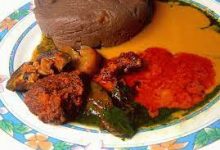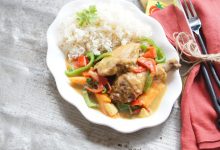
How to Prepare Egusi Soup in Nigeria
In this cooking tips, I will show you how to prepare Egusi Soup in Nigeria. Here you will find the complete recipes and step-by-step instructions to cook your delicious Egusi soup.
Egusi soup is one of the popular soup is Nigeria and its appreciated by all tribes. This soup reminds me of my days in the boarding house as it was a daily meal. There is no day that passes by without a taste of this soup; it could be served in the afternoon or evening whichever case.
👉 Relocate to Canada Today!
Live, Study and Work in Canada. No Payment is Required! Hurry Now click here to Apply >> Immigrate to CanadaI wasn’t impressed with the ethics and at the same time naïve as I didn’t fully understand the rationale behind the action but in due course i adapted. When I got into the tertiary institution, I fully understood the logic, egusi soup is extremely cheap which gives it an edge for feeding more than a thousand students and is as well cherished by all tribes, definitely most kids will love it.

The soup was termed “student soup but i prefer calling it “rescuer”. If you passed through tough times in school, you will grab. During those difficult periods I wasn’t loaded with cash, I always opt for this soup. With just a little change of #200 or #300, i can provide a pot of egusi soup for the week to quench my taste for hunger
Egusi soup can be prepared with bitter leaf, okazi leaf or pumpkin leaf, all has the same cooking pattern. There are different ways of preparing egusi soup
Caking method: This method is deemed healthy because frying is not involved here
Frying method: Where the Egusi is fried in palm oil before other ingredients are added.
Ingredients
Some are required while very few are optional.
- Meat of choice 2kg (beef, chicken turkey, goat meat, or assorted meat)
- Assorted meat is a combination of different parts of a cow4 cups of egusi (melon)
- Dry fish (about two medium sizes)
- 1 cup of ground crayfish
- 1 cup of Ground Osu (optional)
- a good quantity of washed bitterlaef (see the video below)
- 3 stock cubes or other natural sweetener
- 250ml of palm oil
- 2 liters of water
- Salt and pepper to taste.
- One medium size Stock fish head (okporoko) (optional)
- Ogiri or dawadawa or opkei (local ingredients) (optional)
👉 Relocate to Canada Today!
Live, Study and Work in Canada. No Payment is Required! Hurry Now click here to Apply >> Immigrate to CanadaFrying Method Directions
- Parboil the meat of your choice with all necessary ingredients to improve the taste of the meat. This should be done for 10mins after which a little quantity is added to the meat, cook till the meat is tender and water is almost dried. Ingredients like knorr, salts and sliced onions.
- Rinse the vegetables to be used and cut into tiny pieces. If you opt for the bitterleaf (onugbu), make sure its properly wash atleast 95% of the bitterness is removed. if you can’t go through all this process, you can get an already washed bitterleaf from the market , boil for 10mins to get rid of bitterness and for other purposes
- Grind the pepper and crayfish and set aside
- Grind the egusi with a dry blender or dry mill and set aside
- Soak stock fish and dry fish in a bowl of hot water. Wash thoroughly to remove dirt and debone after which you set aside
- Set a dry pot on fire, add the palm oil in the pot and heat up for a minute without allowing it to bleach . Add the egusi and stir until oil has blend with egusi. 8 to 10 minutes can give this result
- Add the cooked meat into the pot, the washed dry fish and stock fish, the grinded crayfish and pepper, 2 cubes of maggi or knorr, stir then add 3 cups of water. Cover pot half way and allow to boil for the next ten to fifteen minutes.
- Stir from time to time to avoid burning.
- At this point you can add one cup of ground osu (optional), a tablespoon of ground ofor or achi.
- Add the finely washed bitter leaves, (or finely sliced ugu [pumpkin]), one spoon of ground dawadawa (local ingredients), taste for salt and pepper.
- Add salt if necessary. If it is too thick, add some water to bring it to a consistency you like.
Caking Method Directions
- Soak stock fish and dry fish in a bowl of hot water for a while then wash and debone.
- Boil the beef, stock fish and dry fish in a litre of water with the stock cubes till they are well done
- As soon as the beef, fish and meat are done, remove them from the stock (water used in cooking the meat and fish) and place in a different pot or plate.
- Add the egusi to the stock and leave to boil until the egusi cakes. If the consistency is a bit too thick, you can add some water to get the consistency of your choice. it is advisable to add water from time to time if consistency is too thick and prevent it from getting burnt
- After like 25minutes, you will notice the egusi oil at the surface of the soup
- Add the red palm oil and bitter leaves
- Add the pepper and salt to taste and cook until oil and egusi has blended properly forming a light yellow colour
- Add one cup of ground osu (optional), a tablespoon of ground ofor or achi(optional)
- Add the cooked meat and fish. or ugu [fluted pumpkin]), one spoon of ground dawadawa (local ingredients), taste for salt and pepper.
- Add salt to your taste, stir and leave to simmer for about 2 minutes
- Turn off the heat. The food is ready
It goes with Pounded yam, Eba (Garri), Agidi, Semolina Fufu, Tuwo Shinkafa, Amala or Cassava Fufu. It also goes with white rice
Egusi with tomatoes recipe
I visited my friend on campus on a certain day and I was served the delicacy for the first time. I found the soup very interesting and delicious, I asked for the preparation method from my friend which she cooperated. I said to myself, I must try it when I get home which I did and it came out just perfect .
Ingredients
- 300ml chopped tomatoes (blended)
- 150ml of vegetable oil
- Cooked Mix of assorted meat.(save the stock)
- 4 tablespoon of crayfish
- Dry fish
- Stockfish (cooked)
- Pepper
- Salt to taste
- Bitter Leaf
- 3-4cups of melon
- Stock cubes
Read Also: How to Cook Africa Cow Leg Pepper Soup; SAIKA
Direction
- Boil your meat and stock fish with the stock cubes
- Dry fish should be cleaned with salt and hot water.
- Tomatoes should be blended and set aside
- Ground crayfish and pepper and set aside
- In a medium pot, heat your oil until hot, add blended tomatoes and allow to fry for about 10-15 minutes.
- Add egusi and allow to cook, stir constantly for 15 minutes then turn the stock together with the meat and stock fish into the pot
- Add the dry fish, crayfish, pepper and stir together and allow to boil for about 15-20 minutes.
- Add salt to taste
- Add bitter leaf and simmer for 5 minutes. Soup is ready



